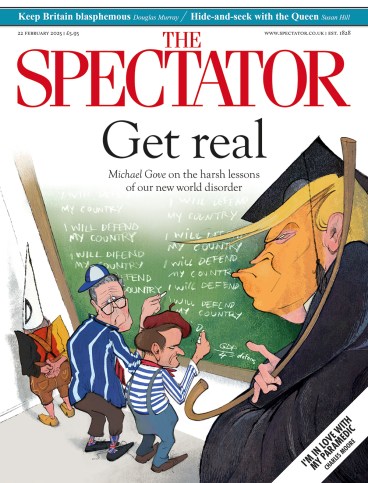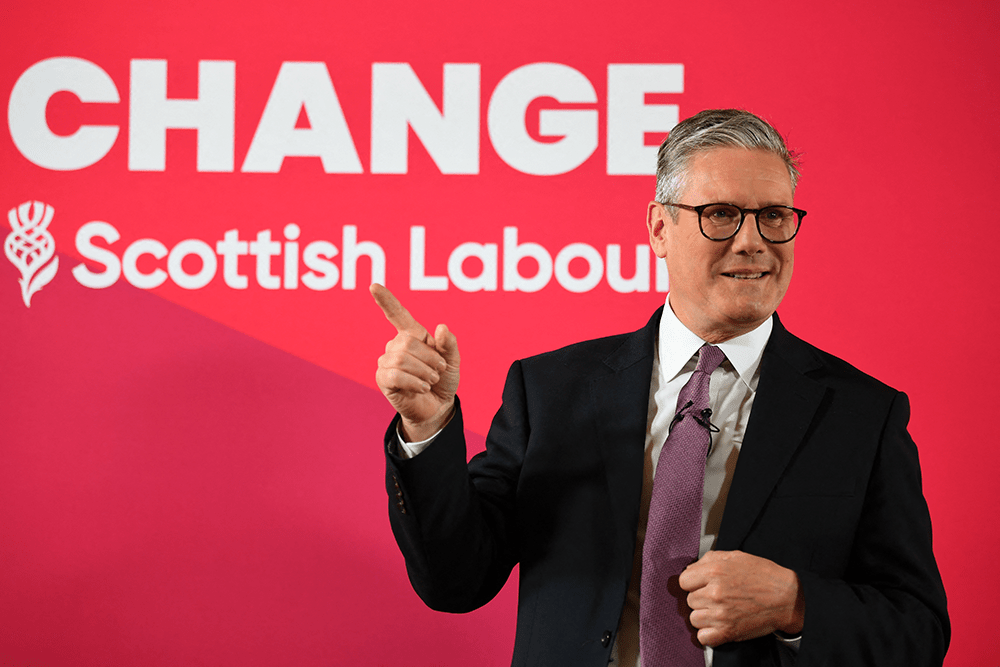
What does a party get after nearly two decades in office, collapsing public services, an internal civil war and a £2 million police investigation? Re-election, again – perhaps with an even bigger majority. Last spring, under the hapless Humza Yousaf, the SNP’s grip on power in Scotland finally appeared to be loosening. But eight months on, the nationalists have managed a remarkable turnaround. The party now has a 15-point poll lead and it looks as though John Swinney will remain in Bute House at next year’s Holyrood elections. ‘The caretaker manager has got the job permanently,’ says one rival.
The party’s change in fortunes owes less to Swinney’s skill as an operator and more to the spectacular collapse of Scottish Labour. As delegates meet in Glasgow for their party conference this weekend, the mood could scarcely be more different to their last shindig. Back then, Labour was topping the polls in both Edinburgh and London. Anas Sarwar, the Scottish Labour leader, was hailed as ‘the next King of Scotland’. When Labour consigned the Tories to history on 4 July, he pledged to do the same with the SNP. ‘The strategy was to ride on Keir Starmer’s coat-tails to success,’ reflects one party veteran. ‘But the problem of riding on someone’s coat-tails is if they go off a cliff, you’re going off with them.’
Scottish Labour’s woes are a tale of two Budgets. The first, in October, was delivered by Rachel Reeves; the second, in December by the SNP’s Shona Robison, Scotland’s Finance Secretary. Reeves gave Scotland an extra £3.4 billion in new funds; Robison duly spent the money and demanded even more. But in this game of tax and spend, accountability has not been apportioned out equally. The SNP got the credit; Scottish Labour the blame. A trifecta of past pledges on winter fuel, pension rights and the two-child benefit cap all came back to haunt Sarwar in Reeves’s Budget. Baffled and infuriated, his MSPs curse a narrative in which they are the villains and the SNP the heroes, protecting the vulnerable. Sarwar acknowledges that his conference speech on Friday ‘has to be a big moment’. Aides have spent hours sweating to get the words right.
Labour’s polling in Scotland is only half of the 35 per cent it won in July. Support has drained away in all directions: unionist rivals and the SNP have taken equal chunks. Swinney has revived Alex Salmond’s original playbook, running a low-key, passably competent administration. The aim is to keep Sarwar on the back foot by constantly forcing him to choose between political expediency and fealty to Starmer. For now, the nats intend to keep ‘wheesht for indy’, preferring instead to bash Westminster. Unionists fear that if a sympathetic Labour government can’t dent support for independence, nothing will. Reeves gave Scotland its largest real-terms funding settlement since devolution – and Labour’s polling duly collapsed. ‘We said we’d put the constitutional issue to bed,’ sighs one minister. ‘But having the SNP there always keeps it awake.’
Scottish Labour and the Tories are both also nervous about what they call ‘the great unknown’ – Reform UK. Nigel Farage’s enterprises have traditionally struggled north of the border. But after mustering 7 per cent in July, Reform’s Holyrood polling has since doubled – enough to win a dozen seats at the next election. Fans and critics alike describe Reform as ‘the plague on all your houses’ or the ‘pissed-off party’, tapping into anti-establishment feeling. Scrapping net zero is the party’s USP: its best polling is in oil-rich Aberdeen. It has nearly 10,000 party members in Scotland. Some 1,200 alone are in Glasgow, where Reform aims to achieve a victory which eluded generations of Catholics – evicting the last elected Tory from the city council in 2027.
Like Scottish leaders before him, Anas Sarwar is discovering that his fortunes rise and fall in Westminster
Like successive Scottish leaders before him, Sarwar is discovering that his fortunes rise and fall in Westminster. Having put blood, sweat and tears into electing 37 MPs last year, he must now watch them from afar making his life harder in Holyrood. ‘It has divided loyalties,’ remarks one ex-adviser. ‘Anas got them in, but the whips determine their future from here.’ At least one new boy has decided silence is not an option, though. Brian Leishman, the MP for Grange-mouth, has bitterly attacked Labour’s inaction on the closure of his local oil refinery. Others are angered by Labour’s family farms tax. A new ‘rural growth group’ aims to coordinate MPs who are concerned: at least 25 of Labour’s rural Scottish seats will be affected, especially those with tenant farmers.
Labour’s Scottish MPs and MSPs are united in their resentment at being shut out from the decision-making process. Once, Labour was ruled by a Tartan Raj. Now metropolitan Englishmen dominate. There are just two born-and-bred Scots in the cabinet (Ian Murray and Pat McFadden). Morgan McSweeney, an Irishman, is a rare example of Celtic genius in No. 10. One Scottish Tory contrasts Starmer’s first ministry with Tony Blair’s: Donald Dewar, Robin Cook, Gordon Brown – ‘the public wouldn’t recognise figures of that calibre in this intake’.

After a decade in which the Scottish Labour party was variously obliterated, hijacked and dismantled, such criticism may be overblown. New talent can be found in MPs such as Kirsty McNeill, Gordon McKee and Blair McDougall. But the simple fact is that Starmer’s No. 10 is working to a very different timetable to that of Sarwar. Ahead of next year’s Senedd elections, Scottish Labour must compete for Downing Street’s attention with a vocal Welsh caucus who are also demanding time, attention and resources. ‘Reform is a threat to us everywhere,’ admits one MP.
In Scotland, Donald Trump is now more popular than Starmer. For Scottish Labour MPs, their hopes rest on the supertanker of the British state turning around by 2029. For Labour’s MSPs, there is pessimism about what can be done in the next 15 months to help stop their polling from plummeting further. ‘The fear is we are yet to reach rock bottom,’ says one.
James discusses Starmer’s Scottish headache further on the latest Coffee House Shots podcast, alongside Michael Gove and Katy Balls:








Comments